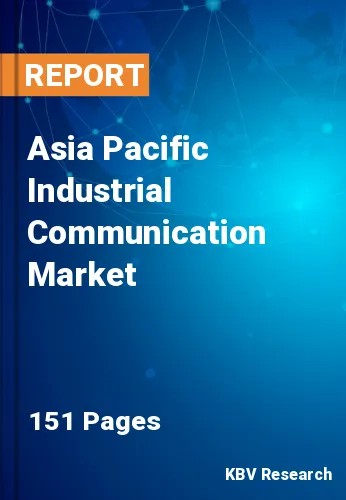The Asia Pacific Industrial Communication Market would witness market growth of 8.6% CAGR during the forecast period (2022-2028).
A stronger and more efficient communication network or scheme is required to facilitate communication between these devices as well as to provide a link between them. They are very different from conventional business networks. Controller, field devices, and PCs can communicate with one another over these industrial networks.
Data and control signals can be transmitted using either wired or wireless transmission means. When the transmission is done across a wire, a cable is employed, which may be a twisted pair, coaxial cable, or fiber optic cable. Each network cable has unique electrical properties that may make it more or less appropriate for a particular network type or setting. When using wireless transmission, radio waves are used for communication.
The foundation for a continuous, end-to-end integration, digitalization, & optimization of the whole value chain, including external suppliers, is built through industrial communication networks, which are essential for a successful digital transformation. As a result, the foundation for highly effective interoperability across all automation components is created by unrestricted data consistency and transparency based on an industrial communication network. In this approach, the businesses can effectively employ their manufacturing facilities and react to market demands with greater flexibility.
Chemicals, oil & gas, semiconductors, consumer electronics, and automotive are the main application industries for industrial communication solutions in the region. The Asia Pacific has become a center of attraction for the production of automobiles. As a result, auto suppliers like Volkswagen, Toyota, Renault-Nissan Alliance, Daimler, and local producers like Tata Motors & Mahindra and Mahindra have invested in automating their manufacturing facilities. In addition to this, there are a lot of small and medium-sized businesses throughout the Asia Pacific. In order to SMEs to adopt robust security procedures in their production units, it is necessary to make sizable expenditures on industrial control system security initiatives.
The China market dominated the Asia Pacific Industrial Communication Market by Country in 2021, and would continue to be a dominant market till 2028; thereby, achieving a market value of $2,782.1 million by 2028. The Japan market is exhibiting a CAGR of 7.9% during (2022 - 2028). Additionally, The India market would display a CAGR of 9.2% during (2022 - 2028).
Based on Offering, the market is segmented into Components (Switches, Controllers & Connectors, Routers & WAP, Gateways, Communication Interfaces & Converters, Power Supply Devices, and Others), Software, and Services. Based on Communication Protocol, the market is segmented into Industrial Ethernet, Fieldbus, and Wireless. Based on Vertical, the market is segmented into Automotive, Electrical & Electronics, Aerospace & Defense, Chemicals & Fertilizers, Pharmaceuticals & Medical Devices, Metals & Mining, Power & Energy, Food & Beverages, and Others. Based on countries, the market is segmented into China, Japan, India, South Korea, Singapore, Malaysia, and Rest of Asia Pacific.
Free Valuable Insights: The Worldwide Industrial Communication Market is Projected to reach USD 28 Billion by 2028, at a CAGR of 8%
The market research report covers the analysis of key stake holders of the market. Key companies profiled in the report include Cisco Systems, Inc., Siemens AG, ABB Group, Schneider Electric SE, Sick AG, Rockwell Automation, Inc., Advantech Co., Ltd., Belden, Inc., Omron Corporation, and Huawei Technologies Co. Ltd.
By Offering
By Communication Protocol
By Vertical
By Country
Our team of dedicated experts can provide you with attractive expansion opportunities for your business.

